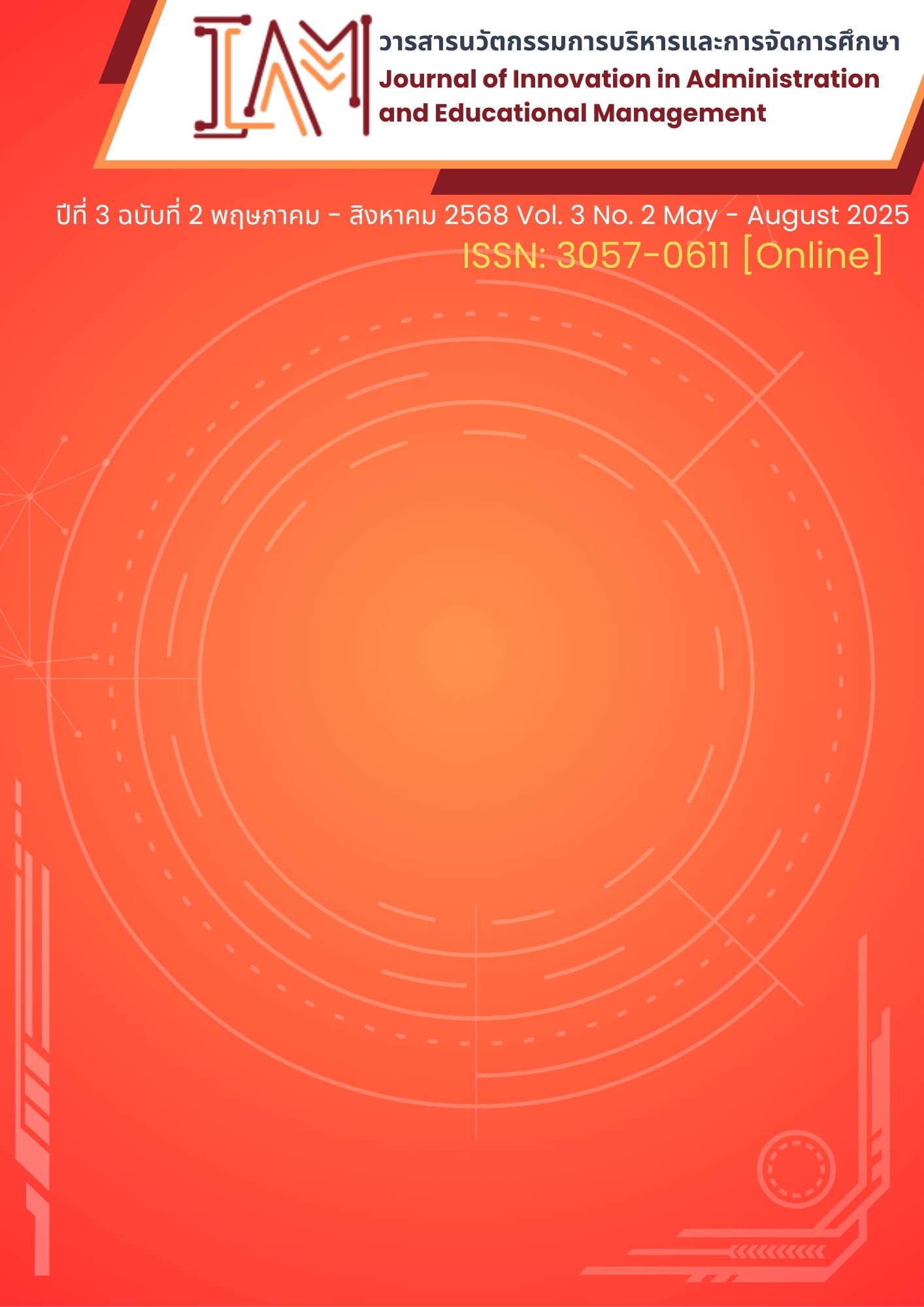Development of Problem-Solving Skills and Learning Achievement in the Legal Issues of Everyday Life through Phenomenon-Based Learning with R-C-A Questioning Technique for Grade 10 Students
Keywords:
Problem-solving ability, academic achievement, phenomenon-based learning, R-C-A questioning technique, legal issues of everyday lifeAbstract
The purpose of this research was to develop problem-solving abilities and learning achievement in the topic of "Law in Daily Life" for Mathayomsuksa 4/3 students at Khon Kaen University Demonstration School (Secondary Division, Faculty of Education) in the first semester of the 2024 academic year using the Phenomenon-Based Learning model combined with R-C-A questioning technique. The criterion was set that no less than 70 percent of students must achieve scores of 70 percent or higher. The sample group consisted of 36 students selected by purposive sampling. The research was conducted using an Action Research methodology with the following research instruments: 1) six lesson plans using the Phenomenon-Based Learning model combined with R-C-A questioning technique, 2) problem-solving ability tests, and 3) learning achievement tests. Quantitative data were analyzed using basic statistics, including mean and percentage, while qualitative data were analyzed through content analysis and summarized in narrative form. The research results revealed that 73.04 percent of students demonstrated problem-solving abilities meeting the specified criteria, and 76.30 percent achieved learning outcomes meeting the specified criteria. This reflects that the Phenomenon-Based Learning approach combined with R-C-A questioning techniques encourages students to develop participatory thinking processes as global citizens through problem analysis, knowledge inquiry, and presentation of diverse problem-solving approaches, while also resulting in higher learning achievement.
Downloads
References
กระทรวงศึกษาธิการ. (2551). หลักสูตรแกนกลางการศึกษาขั้นพื้นฐาน พุทธศักราช 2551. กรุงเทพฯ: โรงพิมพ์ชุมนุมสหกรณ์การเกษตรแห่งประเทศไทย จำกัด.
เชรษฐรัฐ กองรัตน์. (2567). การเรียนรู้โดยใช้ปรากฏการณ์เป็นฐาน : การพัฒนาสมรรถนะการคิดขั้นสูงเพื่อการเรียนรู้อย่างยั่งยืน. วารสารสหวิทยาการมนุษยศาสตร์และสังคมศาสตร์, 7(3), 1701-1720.
ฐากร สิทธิโชค. (2564). แนวทางการจัดการเรียนรู้สังคมศึกษายุคใหม่. สืบค้น 14 มิถุนายน 2567 จาก https://shorturl.asia/1VDe0.
ตะวัน ไชยวรรณ และกุลธิดา นุกูลธรรม. (2564). การจัดการเรียนรู้โดยใช้ปรากฏการณ์เป็นฐาน : การเรียนรู้แบบบูรณาการเพื่อส่งเสริมความรู้ของผู้เรียนในโลกแห่งความจริง. วารสารบัณฑิตศึกษา มหาวิทยาลัยราชภัฏวไลยอลงกรณ์ ในพระบรมราชูปถัมภ์, 15(2), 251-263.
ทัณฑธร จุ้ยสวัสดิ์. (2564). การวิจัยเชิงปฏิบัติการในการจัดการเรียนรู้โดยใช้ปรากฏการณ์เป็นฐาน เรื่อง จลนศาสตร์เคมี ของนักเรียนชั้นมัธยมศึกษาปีที่ 5 เพื่อส่งเสริมผลสัมฤทธิ์ ทางการเรียนและทักษะการคิดอย่างมีวิจารณญาณ. (วิทยานิพนธ์ปริญญาศึกษาศาสตรมหาบัณฑิต). มหาวิทยาลัยวิทยาลัยบูรพา.
ธีระวัฒน์ เซิบรัมย์, ดวงเดือน สุวรรณจินดา และสุจินต์ วิศวธีรานนท์. (2564). ผลการจัดการเรียนรู้โดยใช้ปรากฏการณ์เป็นฐานร่วมกับเทคนิคคําถาม R-C-A ที่มีต่อผลสัมฤทธิ์ทางการเรียนวิทยาศาสตร์และความสามารถในการแก้ปัญหาทางวิทยาศาสตร์ของนักเรียนชั้นประถมศึกษาปีที่ 5 โรงเรียนชุมชนไมตรีอุทิศ จังหวัดนนทบุรี. วารสารวิจัยและพัฒนา มหาวิทยาลัยราชภัฏสวนสุนันทา, 13(1), 82-97.
เพชรรัตน์ จงนิมิตรสถาพร และนภาพร วรเนตรสุดาทิพย์. (2556). เทคนิคคำถาม R-C-A กับการพัฒนาทักษะชีวิต. วารสารศึกษาศาสตร์ มหาวิทยาลัยขอนแก่น, 36(2), 1-5.
วิภาพรรณ พินลาและวิภาดา พินลา. (2565). การเรียนรู้โดยใช้ปรากฏการณ์เป็นฐานที่เชื่อมโยงการบูรณาการข้ามศาสตร์ในห้องเรียนของครูสังคมศึกษา. วารสารศึกษาศาสตร์ มหาวิทยาลัยทักษิณ, 22(2), 1-13.
วัฒนา สุริวรรณ์ และอังคณา ตุงคะสมิต. (2566). การพัฒนาทักษะการคิดแก้ปัญหาเชิงสร้างสรรค์และผลสัมฤทธิ์ทางการเรียนโดยใช้ปรากฏการณ์เป็นฐานร่วมกับเทคนิคคำถาม R–C-A รายวิชา ส 32101 สังคมศึกษาของนักเรียนชั้นมัธยมศึกษาปีที่ 5. วารสารวิชาการหลักสูตรและการสอน มหาวิทยาลัยราชภัฏสกลนคร. 15(43), 63–73.
สุมัทนา หาญสุรีย์. (2563). การศึกษาบนโลกดิจิทัล. วารสารการบริหารการศึกษาและภาวะผู้นำ มหาวิทยาลัยราชภัฏสกลนคร, 8(31), 9-21.
Ausubel, D. P. (1968). Educational psychology: A cognitive view. New York: Holt, Rinehart and Winston.
Kolb, D. A. (1984). Experiential learning: Experience as the source of learning and development. Englewood Cliffs, NJ: Prentice Hall.
Schwab, J. J., & Brandwein, P. F. (1962). The teaching of science as enquiry. Cambridge, MA: Harvard University Press.
Symeonidis, V., & Schwarz, J. F. (2016). Phenomenon-based teaching and learning through the pedagogical lenses of phenomenology: The recent curriculum reform in Finland. Forum Owiatowe, 28(2), 31-47.
Vygotsky, L. S. (1978). Mind in society: The development of higher psychological processes. Cambridge, MA: Harvard University Press.
Downloads
Published
How to Cite
Issue
Section
License
Copyright (c) 2025 Journal of Innovation in Administration and Educational Management

This work is licensed under a Creative Commons Attribution-NonCommercial-NoDerivatives 4.0 International License.






